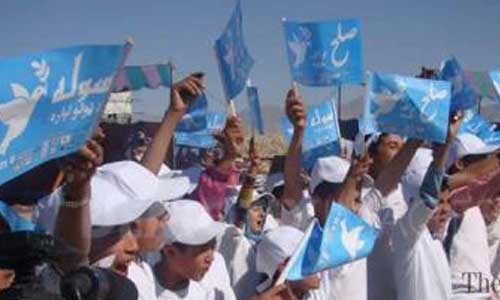In the last talks with US envoy Zalmay Khalilzad in Doha, the Taliban representatives insisted on their preconditions which include the pullout of US troops from Afghanistan, lifting sanctions on their leaders, release of their prisoners and establishment of an official political office in Qatar.
In his 2017 strategy for Afghanistan, the US President Donald Trump said a hasty withdrawal from Afghanistan would lead to horrible consequences similar to those of Iraq and his administration “cannot repeat in Afghanistan the mistake our leaders made in Iraq”. He called himself “problem solver” and promised victory either through military deal or political settlement. Subsequently, he increased the number of soldiers from 8,400 to about 14,000.
Kabul government, however, urged the Taliban to stop killing Afghan people and resolve their issues through negotiation with Afghan High Peace Council.
Turning down Kabul’s peace offer, the Taliban guerilla fighters intensified their attacks against Afghan nation and the number of civilian casualties reached 8,050 – 2,798 dead and 5,252 wounded – in the first nine months of the current year, according to a report released by the United Nations Assistance Mission in Afghanistan.
In the last US-Taliban’s talks, the US has agreed to discuss the pullout of its troops from Afghanistan and the two sides “talked about the end of occupation and a peaceful resolution for the Afghan issue,” Taliban spokesman Zabihullah Mujahid is cited as saying.
It is believed that the withdrawal of US troops will not mark an end to Afghanistan’s conflict. There is a strong gap and mistrust between Kabul and the Taliban leadership. Kabul government will urge the Taliban “to abide by Afghan Constitution”, whereas the Taliban will persist “the return of Sharia”. The former is based on democratic and international principles, while the latter is originated from the fundamental ideology of the Taliban and their radical narrative of religion. Thus, the two contradictory demands will remain a bone of contention between Kabul government and the Taliban leadership. In such a case, the withdrawal of US troops will be a one-step-forward-and-two-step-backward move. Consequently, Trump or his future successor’s administration will re-send its troops to the country similar to that of Iraq to resume its military action.
There is one more possibility that with the pullout of US forces based on agreement with the Taliban, China and Russia will step up their efforts for pushing the Taliban to peace table with Kabul government if insurgency does not come to an end. The room for Iran and Pakistan will also expand for supporting the Afghan-owned and Afghan-led process.
China and Pakistan are believed to be the two heavyweight peace stakeholders in the region and they are willing to support Afghanistan to push the Taliban to the table. The three neighboring countries also established a mechanism for dialogue and cooperation on counterinsurgency. China’s assistance with Kabul government include “political encouragement; diplomatic support in any international, multilateral and regional platforms; QCG and China-Russia-Pakistan trilateral dialogue on Afghan issue,” said Dr. Zeng Xiangyu, scholar of South Asian Studies at Sichuan University. “I don’t think,” Zeng said, “China is in the position to bring Taliban to negotiating table.” But in terms of Pakistan, he answered positively saying that “Pakistan has a leverage over the Taliban”.
Kabul government calls regional countries in general and China and Pakistan in particular to partner it with peace talks and counterinsurgency. So, Kabul will welcome regional support for being more effective and productive. Likewise, Kabul government expects the international community to support Afghanistan in counterinsurgency as well as peace process.
Although Washington has put all its weight behind the peace talks through appointing Khalilzad as its special representative for Afghanistan reconciliation and discussing the pullout of its troops from the country, the Taliban’s unmitigated insurgency signals their insincerity to the talks. If the negotiations do not bear the desired result, neither Trump will be a “problem solver” nor his administration the winner.
All in all, the US is advised to consider two points: First, it should not ignore the role of regional countries, mainly China and Pakistan, in the peace process. Second, it must act more cautiously so that the mistake made in Iraq could not be repeated in Afghanistan.
Meanwhile, the Taliban have to stop holding the negotiations as a political game, stop their insurgency and practice upon any agreement made with their interlocutors. If the Taliban guerilla fighters do not stop their insurgency in the country despite reaching a census with their interlocutors, a potential window for a peace deal, backed by regional and international powers, may be closed. In short, the Taliban should either come to the table with bona fide intention, or face the consequences of a strong military action by Kabul and its international allies.
Home » Opinion » Regional Stakeholders Should Involve in Afghan Peace Process
Regional Stakeholders Should Involve in Afghan Peace Process
| Hujjatullah Zia

